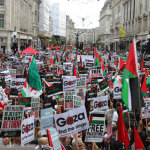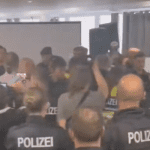Pro-Palestinian demonstrators at Columbia University have occupied an academic building as part of their protest over the war in Gaza.
Dozens of activists seized Hamilton Hall early on Tuesday and barricaded themselves inside.
The university and police are yet to comment.
Columbia earlier began suspending students involved in a two-week encampment who defied a deadline to disperse.
Students were warned they would face disciplinary action if they failed to move by 14:00 EST (18:00 GMT) on Monday.
But as the deadline passed, dozens of students rallied at the site.
Columbia Students for Justice in Palestine (SJP), one of the main protest groups, vowed to defy the order in a post on X and called on activists to “protect the encampment”.
The group later said it had taken over Hamilton Hall, highlighting that this was also the focus of student protests in 1968.
Images from the site on Tuesday show the building with broken windows. Protesters blocked doors with wooden tables and chairs, the Columbia Spectator reported.
Another group, Columbia University Apartheid Divest (CUAD), said it had “reclaimed” the building in honour of Hind Rajab, a six-year-old girl found dead in Gaza earlier this year.
Similar demonstrations against the war in Gaza have taken place across the US in recent weeks since police cleared an earlier encampment at Columbia.
On Monday, police also arrested dozens of protesters and dismantled their camp at the University of Texas at Austin.
Officials there said protesters had ignored directions to take down their tents and that “baseball-size rocks” had been found in the encampment.
The BBC has contacted the university and local police for comment.
Activists across the US are demanding that their universities, many with massive endowments, financially divest from Israel. Divestment means to sell or otherwise drop financial ties.
Pressure on the leadership of Columbia, an elite Ivy League university in Upper Manhattan, has been building to act or step aside.
Posting on X before the occupation of Hamilton Hall, US House Speaker Mike Johnson labelled the scenes at Columbia an “utter disgrace”. He added: “The campus is being overrun by antisemitic students and faculty alike.”
The Louisiana Republican again called for the university’s president, Dr Minouche Shafik, to step down.
Columbia’s campus has become the focal point of the country’s debate over the war in Gaza and US support for Israel, as well as fears that antisemitism is putting Jewish students in danger.
Earlier on Monday, a group of House Democrats urged its board of trustees to resign if it could not “act decisively, disband the encampment, and ensure the safety and security of all of its students”.
Pro-Palestinian demonstrators at Columbia University have occupied an academic building as part of their protest over the war in Gaza.
Dozens of activists seized Hamilton Hall early on Tuesday and barricaded themselves inside.
The university and police are yet to comment.
Columbia earlier began suspending students involved in a two-week encampment who defied a deadline to disperse.
Students were warned they would face disciplinary action if they failed to move by 14:00 EST (18:00 GMT) on Monday.
But as the deadline passed, dozens of students rallied at the site.
Columbia Students for Justice in Palestine (SJP), one of the main protest groups, vowed to defy the order in a post on X and called on activists to “protect the encampment”.
The group later said it had taken over Hamilton Hall, highlighting that this was also the focus of student protests in 1968.
Images from the site on Tuesday show the building with broken windows. Protesters blocked doors with wooden tables and chairs, the Columbia Spectator reported.
Another group, Columbia University Apartheid Divest (CUAD), said it had “reclaimed” the building in honour of Hind Rajab, a six-year-old girl found dead in Gaza earlier this year.
Similar demonstrations against the war in Gaza have taken place across the US in recent weeks since police cleared an earlier encampment at Columbia.
On Monday, police also arrested dozens of protesters and dismantled their camp at the University of Texas at Austin.
Officials there said protesters had ignored directions to take down their tents and that “baseball-size rocks” had been found in the encampment.
The BBC has contacted the university and local police for comment.
Activists across the US are demanding that their universities, many with massive endowments, financially divest from Israel. Divestment means to sell or otherwise drop financial ties.
Pressure on the leadership of Columbia, an elite Ivy League university in Upper Manhattan, has been building to act or step aside.
Posting on X before the occupation of Hamilton Hall, US House Speaker Mike Johnson labelled the scenes at Columbia an “utter disgrace”. He added: “The campus is being overrun by antisemitic students and faculty alike.”
The Louisiana Republican again called for the university’s president, Dr Minouche Shafik, to step down.
Columbia’s campus has become the focal point of the country’s debate over the war in Gaza and US support for Israel, as well as fears that antisemitism is putting Jewish students in danger.
Earlier on Monday, a group of House Democrats urged its board of trustees to resign if it could not “act decisively, disband the encampment, and ensure the safety and security of all of its students”.
Pro-Palestinian demonstrators at Columbia University have occupied an academic building as part of their protest over the war in Gaza.
Dozens of activists seized Hamilton Hall early on Tuesday and barricaded themselves inside.
The university and police are yet to comment.
Columbia earlier began suspending students involved in a two-week encampment who defied a deadline to disperse.
Students were warned they would face disciplinary action if they failed to move by 14:00 EST (18:00 GMT) on Monday.
But as the deadline passed, dozens of students rallied at the site.
Columbia Students for Justice in Palestine (SJP), one of the main protest groups, vowed to defy the order in a post on X and called on activists to “protect the encampment”.
The group later said it had taken over Hamilton Hall, highlighting that this was also the focus of student protests in 1968.
Images from the site on Tuesday show the building with broken windows. Protesters blocked doors with wooden tables and chairs, the Columbia Spectator reported.
Another group, Columbia University Apartheid Divest (CUAD), said it had “reclaimed” the building in honour of Hind Rajab, a six-year-old girl found dead in Gaza earlier this year.
Similar demonstrations against the war in Gaza have taken place across the US in recent weeks since police cleared an earlier encampment at Columbia.
On Monday, police also arrested dozens of protesters and dismantled their camp at the University of Texas at Austin.
Officials there said protesters had ignored directions to take down their tents and that “baseball-size rocks” had been found in the encampment.
The BBC has contacted the university and local police for comment.
Activists across the US are demanding that their universities, many with massive endowments, financially divest from Israel. Divestment means to sell or otherwise drop financial ties.
Pressure on the leadership of Columbia, an elite Ivy League university in Upper Manhattan, has been building to act or step aside.
Posting on X before the occupation of Hamilton Hall, US House Speaker Mike Johnson labelled the scenes at Columbia an “utter disgrace”. He added: “The campus is being overrun by antisemitic students and faculty alike.”
The Louisiana Republican again called for the university’s president, Dr Minouche Shafik, to step down.
Columbia’s campus has become the focal point of the country’s debate over the war in Gaza and US support for Israel, as well as fears that antisemitism is putting Jewish students in danger.
Earlier on Monday, a group of House Democrats urged its board of trustees to resign if it could not “act decisively, disband the encampment, and ensure the safety and security of all of its students”.
Pro-Palestinian demonstrators at Columbia University have occupied an academic building as part of their protest over the war in Gaza.
Dozens of activists seized Hamilton Hall early on Tuesday and barricaded themselves inside.
The university and police are yet to comment.
Columbia earlier began suspending students involved in a two-week encampment who defied a deadline to disperse.
Students were warned they would face disciplinary action if they failed to move by 14:00 EST (18:00 GMT) on Monday.
But as the deadline passed, dozens of students rallied at the site.
Columbia Students for Justice in Palestine (SJP), one of the main protest groups, vowed to defy the order in a post on X and called on activists to “protect the encampment”.
The group later said it had taken over Hamilton Hall, highlighting that this was also the focus of student protests in 1968.
Images from the site on Tuesday show the building with broken windows. Protesters blocked doors with wooden tables and chairs, the Columbia Spectator reported.
Another group, Columbia University Apartheid Divest (CUAD), said it had “reclaimed” the building in honour of Hind Rajab, a six-year-old girl found dead in Gaza earlier this year.
Similar demonstrations against the war in Gaza have taken place across the US in recent weeks since police cleared an earlier encampment at Columbia.
On Monday, police also arrested dozens of protesters and dismantled their camp at the University of Texas at Austin.
Officials there said protesters had ignored directions to take down their tents and that “baseball-size rocks” had been found in the encampment.
The BBC has contacted the university and local police for comment.
Activists across the US are demanding that their universities, many with massive endowments, financially divest from Israel. Divestment means to sell or otherwise drop financial ties.
Pressure on the leadership of Columbia, an elite Ivy League university in Upper Manhattan, has been building to act or step aside.
Posting on X before the occupation of Hamilton Hall, US House Speaker Mike Johnson labelled the scenes at Columbia an “utter disgrace”. He added: “The campus is being overrun by antisemitic students and faculty alike.”
The Louisiana Republican again called for the university’s president, Dr Minouche Shafik, to step down.
Columbia’s campus has become the focal point of the country’s debate over the war in Gaza and US support for Israel, as well as fears that antisemitism is putting Jewish students in danger.
Earlier on Monday, a group of House Democrats urged its board of trustees to resign if it could not “act decisively, disband the encampment, and ensure the safety and security of all of its students”.
Pro-Palestinian demonstrators at Columbia University have occupied an academic building as part of their protest over the war in Gaza.
Dozens of activists seized Hamilton Hall early on Tuesday and barricaded themselves inside.
The university and police are yet to comment.
Columbia earlier began suspending students involved in a two-week encampment who defied a deadline to disperse.
Students were warned they would face disciplinary action if they failed to move by 14:00 EST (18:00 GMT) on Monday.
But as the deadline passed, dozens of students rallied at the site.
Columbia Students for Justice in Palestine (SJP), one of the main protest groups, vowed to defy the order in a post on X and called on activists to “protect the encampment”.
The group later said it had taken over Hamilton Hall, highlighting that this was also the focus of student protests in 1968.
Images from the site on Tuesday show the building with broken windows. Protesters blocked doors with wooden tables and chairs, the Columbia Spectator reported.
Another group, Columbia University Apartheid Divest (CUAD), said it had “reclaimed” the building in honour of Hind Rajab, a six-year-old girl found dead in Gaza earlier this year.
Similar demonstrations against the war in Gaza have taken place across the US in recent weeks since police cleared an earlier encampment at Columbia.
On Monday, police also arrested dozens of protesters and dismantled their camp at the University of Texas at Austin.
Officials there said protesters had ignored directions to take down their tents and that “baseball-size rocks” had been found in the encampment.
The BBC has contacted the university and local police for comment.
Activists across the US are demanding that their universities, many with massive endowments, financially divest from Israel. Divestment means to sell or otherwise drop financial ties.
Pressure on the leadership of Columbia, an elite Ivy League university in Upper Manhattan, has been building to act or step aside.
Posting on X before the occupation of Hamilton Hall, US House Speaker Mike Johnson labelled the scenes at Columbia an “utter disgrace”. He added: “The campus is being overrun by antisemitic students and faculty alike.”
The Louisiana Republican again called for the university’s president, Dr Minouche Shafik, to step down.
Columbia’s campus has become the focal point of the country’s debate over the war in Gaza and US support for Israel, as well as fears that antisemitism is putting Jewish students in danger.
Earlier on Monday, a group of House Democrats urged its board of trustees to resign if it could not “act decisively, disband the encampment, and ensure the safety and security of all of its students”.
Pro-Palestinian demonstrators at Columbia University have occupied an academic building as part of their protest over the war in Gaza.
Dozens of activists seized Hamilton Hall early on Tuesday and barricaded themselves inside.
The university and police are yet to comment.
Columbia earlier began suspending students involved in a two-week encampment who defied a deadline to disperse.
Students were warned they would face disciplinary action if they failed to move by 14:00 EST (18:00 GMT) on Monday.
But as the deadline passed, dozens of students rallied at the site.
Columbia Students for Justice in Palestine (SJP), one of the main protest groups, vowed to defy the order in a post on X and called on activists to “protect the encampment”.
The group later said it had taken over Hamilton Hall, highlighting that this was also the focus of student protests in 1968.
Images from the site on Tuesday show the building with broken windows. Protesters blocked doors with wooden tables and chairs, the Columbia Spectator reported.
Another group, Columbia University Apartheid Divest (CUAD), said it had “reclaimed” the building in honour of Hind Rajab, a six-year-old girl found dead in Gaza earlier this year.
Similar demonstrations against the war in Gaza have taken place across the US in recent weeks since police cleared an earlier encampment at Columbia.
On Monday, police also arrested dozens of protesters and dismantled their camp at the University of Texas at Austin.
Officials there said protesters had ignored directions to take down their tents and that “baseball-size rocks” had been found in the encampment.
The BBC has contacted the university and local police for comment.
Activists across the US are demanding that their universities, many with massive endowments, financially divest from Israel. Divestment means to sell or otherwise drop financial ties.
Pressure on the leadership of Columbia, an elite Ivy League university in Upper Manhattan, has been building to act or step aside.
Posting on X before the occupation of Hamilton Hall, US House Speaker Mike Johnson labelled the scenes at Columbia an “utter disgrace”. He added: “The campus is being overrun by antisemitic students and faculty alike.”
The Louisiana Republican again called for the university’s president, Dr Minouche Shafik, to step down.
Columbia’s campus has become the focal point of the country’s debate over the war in Gaza and US support for Israel, as well as fears that antisemitism is putting Jewish students in danger.
Earlier on Monday, a group of House Democrats urged its board of trustees to resign if it could not “act decisively, disband the encampment, and ensure the safety and security of all of its students”.
Pro-Palestinian demonstrators at Columbia University have occupied an academic building as part of their protest over the war in Gaza.
Dozens of activists seized Hamilton Hall early on Tuesday and barricaded themselves inside.
The university and police are yet to comment.
Columbia earlier began suspending students involved in a two-week encampment who defied a deadline to disperse.
Students were warned they would face disciplinary action if they failed to move by 14:00 EST (18:00 GMT) on Monday.
But as the deadline passed, dozens of students rallied at the site.
Columbia Students for Justice in Palestine (SJP), one of the main protest groups, vowed to defy the order in a post on X and called on activists to “protect the encampment”.
The group later said it had taken over Hamilton Hall, highlighting that this was also the focus of student protests in 1968.
Images from the site on Tuesday show the building with broken windows. Protesters blocked doors with wooden tables and chairs, the Columbia Spectator reported.
Another group, Columbia University Apartheid Divest (CUAD), said it had “reclaimed” the building in honour of Hind Rajab, a six-year-old girl found dead in Gaza earlier this year.
Similar demonstrations against the war in Gaza have taken place across the US in recent weeks since police cleared an earlier encampment at Columbia.
On Monday, police also arrested dozens of protesters and dismantled their camp at the University of Texas at Austin.
Officials there said protesters had ignored directions to take down their tents and that “baseball-size rocks” had been found in the encampment.
The BBC has contacted the university and local police for comment.
Activists across the US are demanding that their universities, many with massive endowments, financially divest from Israel. Divestment means to sell or otherwise drop financial ties.
Pressure on the leadership of Columbia, an elite Ivy League university in Upper Manhattan, has been building to act or step aside.
Posting on X before the occupation of Hamilton Hall, US House Speaker Mike Johnson labelled the scenes at Columbia an “utter disgrace”. He added: “The campus is being overrun by antisemitic students and faculty alike.”
The Louisiana Republican again called for the university’s president, Dr Minouche Shafik, to step down.
Columbia’s campus has become the focal point of the country’s debate over the war in Gaza and US support for Israel, as well as fears that antisemitism is putting Jewish students in danger.
Earlier on Monday, a group of House Democrats urged its board of trustees to resign if it could not “act decisively, disband the encampment, and ensure the safety and security of all of its students”.
Pro-Palestinian demonstrators at Columbia University have occupied an academic building as part of their protest over the war in Gaza.
Dozens of activists seized Hamilton Hall early on Tuesday and barricaded themselves inside.
The university and police are yet to comment.
Columbia earlier began suspending students involved in a two-week encampment who defied a deadline to disperse.
Students were warned they would face disciplinary action if they failed to move by 14:00 EST (18:00 GMT) on Monday.
But as the deadline passed, dozens of students rallied at the site.
Columbia Students for Justice in Palestine (SJP), one of the main protest groups, vowed to defy the order in a post on X and called on activists to “protect the encampment”.
The group later said it had taken over Hamilton Hall, highlighting that this was also the focus of student protests in 1968.
Images from the site on Tuesday show the building with broken windows. Protesters blocked doors with wooden tables and chairs, the Columbia Spectator reported.
Another group, Columbia University Apartheid Divest (CUAD), said it had “reclaimed” the building in honour of Hind Rajab, a six-year-old girl found dead in Gaza earlier this year.
Similar demonstrations against the war in Gaza have taken place across the US in recent weeks since police cleared an earlier encampment at Columbia.
On Monday, police also arrested dozens of protesters and dismantled their camp at the University of Texas at Austin.
Officials there said protesters had ignored directions to take down their tents and that “baseball-size rocks” had been found in the encampment.
The BBC has contacted the university and local police for comment.
Activists across the US are demanding that their universities, many with massive endowments, financially divest from Israel. Divestment means to sell or otherwise drop financial ties.
Pressure on the leadership of Columbia, an elite Ivy League university in Upper Manhattan, has been building to act or step aside.
Posting on X before the occupation of Hamilton Hall, US House Speaker Mike Johnson labelled the scenes at Columbia an “utter disgrace”. He added: “The campus is being overrun by antisemitic students and faculty alike.”
The Louisiana Republican again called for the university’s president, Dr Minouche Shafik, to step down.
Columbia’s campus has become the focal point of the country’s debate over the war in Gaza and US support for Israel, as well as fears that antisemitism is putting Jewish students in danger.
Earlier on Monday, a group of House Democrats urged its board of trustees to resign if it could not “act decisively, disband the encampment, and ensure the safety and security of all of its students”.














